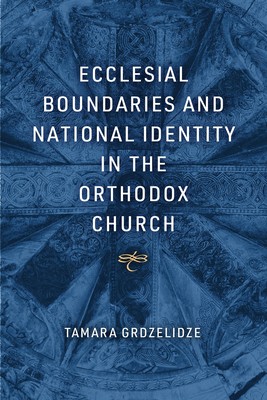
- We will send in 10–14 business days.
- Author: Tamara Grdzelidze
- Publisher: University of Notre Dame Press
- ISBN-10: 0268204985
- ISBN-13: 9780268204983
- Format: 15.2 x 22.9 x 1.8 cm, kieti viršeliai
- Language: English
- SAVE -10% with code: EXTRA
Ecclesial Boundaries and National Identity in the Orthodox Church (e-book) (used book) | bookbook.eu
Reviews
Description
Grdzelidze's study evaluates the present state of ecclesiology in the Orthodox Church, focusing on the history of autocephaly and its relationship with the rise of religious nationalism.
To date, the Orthodox Church has not sufficiently addressed the pressing problem of religious nationalism. Tamara Grdzelidze's Ecclesial Boundaries and National Identity in the Orthodox Church fills this lacuna, offering a solution to the ecclesiological problems posed by the rise of group-related sentiment in Orthodox communities.
Grdzelidze's monograph begins with an examination of the history of autocephaly and synodality in the Orthodox Church. As she explains, the political autonomy of local churches in the Eastern Roman Empire, which was later transformed into autocephaly, instinctively carried the kernel of group-related sentiments, whether national or ethnic. Over time, such sentiments have given rise to religious nationalism, which has further resulted in the inability of autocephalous churches to disengage from their national political involvements. Consequently, Orthodox Churches are unable to conduct a conversation on the hermeneutics of authority.
After sketching this historical background, Grdzelidze offers a solution to this ecclesiological problem, proposing a eucharistic hermeneutics by which the concepts of autocephaly and synodality might be preserved from misappropriation by religious nationalists. This proposal is centered on the principle that the Church represents the Body of Christ and thus embraces the whole people of God and the whole of God's creation through the sacramental life. Ultimately, this eucharistic mode of visioning the Church furnishes a solution to the crisis of borders and boundaries in the Orthodox Church.
EXTRA 10 % discount with code: EXTRA
The promotion ends in 22d.02:48:43
The discount code is valid when purchasing from 10 €. Discounts do not stack.
- Author: Tamara Grdzelidze
- Publisher: University of Notre Dame Press
- ISBN-10: 0268204985
- ISBN-13: 9780268204983
- Format: 15.2 x 22.9 x 1.8 cm, kieti viršeliai
- Language: English English
Grdzelidze's study evaluates the present state of ecclesiology in the Orthodox Church, focusing on the history of autocephaly and its relationship with the rise of religious nationalism.
To date, the Orthodox Church has not sufficiently addressed the pressing problem of religious nationalism. Tamara Grdzelidze's Ecclesial Boundaries and National Identity in the Orthodox Church fills this lacuna, offering a solution to the ecclesiological problems posed by the rise of group-related sentiment in Orthodox communities.
Grdzelidze's monograph begins with an examination of the history of autocephaly and synodality in the Orthodox Church. As she explains, the political autonomy of local churches in the Eastern Roman Empire, which was later transformed into autocephaly, instinctively carried the kernel of group-related sentiments, whether national or ethnic. Over time, such sentiments have given rise to religious nationalism, which has further resulted in the inability of autocephalous churches to disengage from their national political involvements. Consequently, Orthodox Churches are unable to conduct a conversation on the hermeneutics of authority.
After sketching this historical background, Grdzelidze offers a solution to this ecclesiological problem, proposing a eucharistic hermeneutics by which the concepts of autocephaly and synodality might be preserved from misappropriation by religious nationalists. This proposal is centered on the principle that the Church represents the Body of Christ and thus embraces the whole people of God and the whole of God's creation through the sacramental life. Ultimately, this eucharistic mode of visioning the Church furnishes a solution to the crisis of borders and boundaries in the Orthodox Church.


Reviews